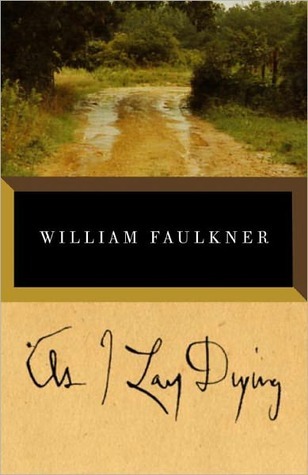More on this book
Community
Kindle Notes & Highlights
“I mislike undecision as much as ere a man,” pa says.
Jewel’s eyes look like pale wood in his high-blooded face.
Like most folks around here, I done holp him so much already I cant quit now.
The sun, an hour above the horizon, is poised like a bloody egg upon a crest of thunderheads;
Anse has not been in town in twelve years.
I can remember how when I was young I believed death to be a phenomenon of the body; now I know it to be merely a function of the mind—and that of the minds of the ones who suffer the bereavement.
Beneath the quilt she is no more than a bundle of rotten sticks.
Pa breathes with a quiet, rasping sound, mouthing the snuff against his gums. “God’s will be done,” he says. “Now I can get them teeth.” Jewel’s hat droops limp
It begins to rain. The first harsh, sparse, swift drops rush through the leaves and across the ground in a long sigh, as though of relief from intolerable suspense.
Upon his face the rain streams, slow as cold glycerin.
My mother is a fish.
It was in the year 1888,” Uncle Billy says.
“If I’d a crossed it every time your wife littered since, it’d a been wore out
it aint the moving he hates so much as the starting and the stopping.
and they’ll sholy get started by daylight.”
or if it wasn’t just knowing it was what it was.
And now he has three children that are his and not mine. And then I could get ready to die.
cursing the horse in a whisper of obscene caress.
When Darl loosens the rope Cash begins to sweat again. His teeth look out. “Hurt?” Darl says.
Cash’s teeth look out.
Overhead the flames sound like thunder;
“Quick,” I say; “the horses.”
ballooning about his hairy thighs.
When I reach the front, he is struggling with Gillespie; the one lean in underclothes, the other stark naked.
and in a sense it was the value of the horse Darl tried to burn up.
But I thought more than once before we crossed the river and after, how it would be God’s blessing if He did take her outen our hands and get shut of her in some clean way,
seemed to me that when Jewel worked so to get her outen the river, he was goi...
This highlight has been truncated due to consecutive passage length restrictions.
And then I always kind of had a idea that him and Dewey Dell kind of knowed things betwixt them.
“You mean, it never bothered Anse much,” I said. “No more than it bothered him to throw that poor devil down in the public street and handcuff him like a damn murderer.
Pa was coming along with that kind of daresome and hangdog look all at once like when he has been up to something he knows ma aint going to like, carrying a grip in his hand, and Jewel says, “Who’s that?”
“Meet Mrs Bundren,” he says.
“I set out deliberately to write a tour-de-force,” he claimed later. “Before I ever put pen to paper and set down the first words, I knew what the last word would be.… Before I began I said, I am going to write a book by which, at a pinch, I can stand or fall if I never touch ink again.” He wrote As I Lay Dying at the University of Mississippi power plant, where he was employed as a fireman and night watchman, mostly in the early morning, after everybody had gone to bed and power needs had diminished.
He finished the typing, according to the date on the carbon typescript, on January 12, 1930, and sent it to Harrison Smith, who published it with very few editorial changes on October 6, 1930.
… away.] Book Four of The Hamlet (1940) tells the story of the incursion of these “spotted horses” into Yoknapatawpha County in the first decade of the twentieth century. 12 there … sinned] See Jesus’ parable of the lost sheep in Luke 15:7.
READER’S GUIDE
Does Jewel know who his father is?
In one of the novel’s central passages, Addie meditates upon the distance between words and actions: “I would think how words go straight up in a thin line, quick and harmless, and how terribly doing goes along the earth, clinging to it, so that after a while the two lines are too far apart for the same person to straddle from one to the other; and that sin and love and fear are just sounds that people who never sinned nor loved nor feared have for what they never had and cannot have until they forget the words” [see here]. What light does this passage shed upon the meaning of the novel?
Or is Faulkner saying that words—his own chosen medium—are inadequate?
his first novel, Soldier’s Pay, was published in 1926.


